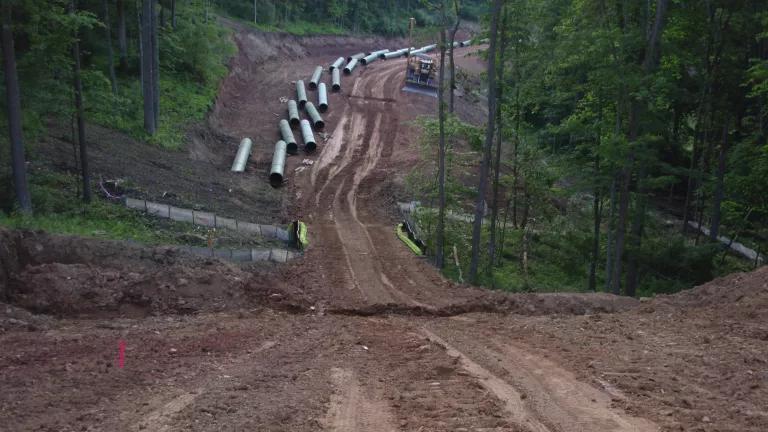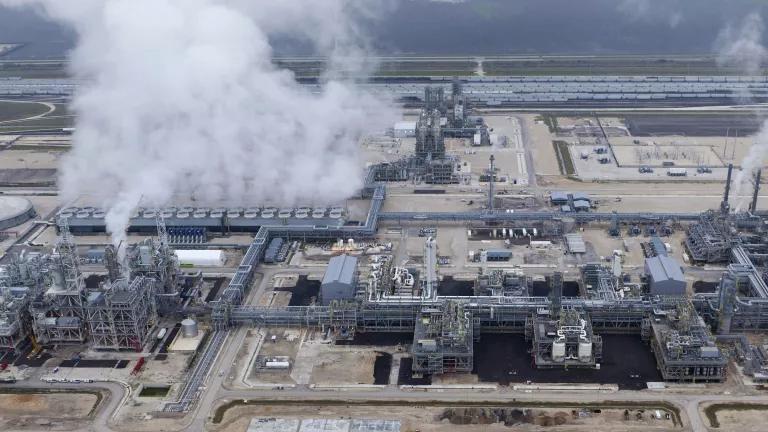Pipe Dreams: Economic & Jobs Myths of Natural Gas Pipelines

NRDC recently commissioned an analysis from economists at the Applied Economics Clinic at Tufts University to dig into the repeated claim by project proponents that new interstate natural gas pipelines like the Atlantic Coast Pipeline (ACP) or Mountain Valley Pipeline (MVP) will: (1) save consumers money relative to alternative energy sources; and (2) lead to new manufacturing jobs.
Don’t believe the hype.
The owners of the Atlantic Coast Pipeline assert that it will “create thousands of new jobs in manufacturing and other industries.” Owners of the Mountain Valley Pipeline claim that “Increased supply also would provide opportunities for manufacturing expansions." Elected officials have often latched onto these claims to justify their support for new pipelines.
This new analysis from Tufts economists, however, found that the emperor has no clothes. They conclude: “There is no clear support for the claim that the ACP would lead to additional opportunities for new manufacturing in the region, and this is likely the case for other new natural gas pipelines such as the Mountain Valley Pipeline.”
In addition, NRDC’s own analysis finds that investing the amount of money that the pipelines would cost in clean energy could support more than 9,000 gross direct and indirect jobs in Virginia, North Carolina, and West Virginia over the next 20 years. This is three times more jobs than ACP owners estimate their pipeline will create over the same time frame.
Among the key findings of this new analysis:
- A lot has changed since 2015, when consultants for the ACP estimated that the pipeline would make lower cost natural gas available to electric utilities, and therefore lead to savings for consumers. Essentially, the claims of major savings for consumers from building the ACP from just a couple of years ago have now eroded to the point where analysis now finds consumers will face a net increase in energy costs if Virginia regulators approve the pipeline and it is constructed. This more up-to-date analysis found:
“Many new and expanded natural gas pipelines have been completed since February 2015…. The U.S. Energy Administration (EIA) notes that just over 4.0 billion cubic feet per day (Bcf/d) of inter-regional pipeline capacity was added during 2016 alone…. An additional 7.2 Bcf/d of additional capacity is currently under construction and is expected to be fully operational by the end of 2017.”
Since 2015, the price difference between the current and proposed gas price hubs has already declined by 73 percent due to this additional capacity. In fact, the Tufts consultants point out that, because of these and other changes, expert analysis has found that “the ACP will actually increase customer costs between $1.61 and $2.36 billion” over the initial 20-year contract period.
- Other things have also changed since 2015, when the owners of the ACP argued that there would be increasing demand for natural gas as the primary fuel source for electric power generation in Virginia and North Carolina. The Tufts economists found that, since 2015:
...electric utilities in the territories that would be served by the ACP have revised forecasts of electric demand downward….”
The Tufts economists conclude that there is much less need for new electric generating capacity than initially estimated by ACP and its consultants, and that therefore there is much lower demand for natural gas.
- Even when there are lower electricity prices, many states do not see increases in manufacturing jobs. The Tufts analysis found that:
“Of the states that realize declines in their electricity prices over the two-year period from 2015 to 2017, a similar number see a negative change in their number of manufacturing jobs as see a positive change. The same is true for states in which electricity prices rose—manufacturing jobs increased in some states and decreased in others.”
- New natural gas pipelines are not correlated with new manufacturing jobs:
“….Seven states with additional pipeline capacity saw both falling electricity prices and losses to manufacturing jobs, including Virginia…”
They conclude:
“Recent evidence from states with new natural gas pipeline capacity shows no support for the conclusion that the addition of new pipelines leads to additional opportunities for new manufacturing jobs in those states. There is also no support for claims that the ACP or the MVP would lead to an increased number of manufacturing jobs in West Virginia, Virginia, and North Carolina.”
The Clean Energy Truth
In addition to our commissioned analysis, using publicly available data from sources such as EIA, company press releases and ACEEE, NRDC crunched preliminary numbers on the jobs and economic impacts that would result from a comparable buildout of truly clean resources such as wind, solar and energy efficiency. Below are our takeaways on the hollow myth that the ACP is a massive employment engine. Moving toward a real 21st century clean energy economy for the commonwealth can be a much better economic and job creator:
- For the same amount of money spent on building the pipeline, an additional 1,500 MW of new renewable power could be built in Virginia, North Carolina, and West Virginia—enough to power almost 400,000 homes.
- And if these states instead invested the expected operational expenses of the pipeline into energy efficiency programs, it could boost incremental energy savings by over 2.8 million MWh a year (a three-fold increase from current energy efficiency savings in these three states).
- These clean energy investments could support over 9,000 gross direct and indirect jobs in the three states over the next 20 years. This is three times greater than the estimated employment impacts than the ACP projects over the same period.
Do the Right Thing: Virginians’ Fate Lies in the Hands of the Water Board
As the Virginia State Water Control Board begins its deliberations on the Clean Water Act certification for ACP and MVP this week, it is increasingly clear that there is no need for either of these pipelines. This new analysis questions the Atlantic Coast Pipeline (and by association the Mountain Valley Pipeline) manufacturing jobs growth, and shows a better, cleaner course of action that gives the Water Board reason to hit the pause button on whether to approve permits for either project: It can take the additional time needed to thoroughly investigate the risks from each water crossing of each pipeline, rather than approve the rushed and inadequate certification that has been recommended by Virginia’s Department of Environmental Quality.




